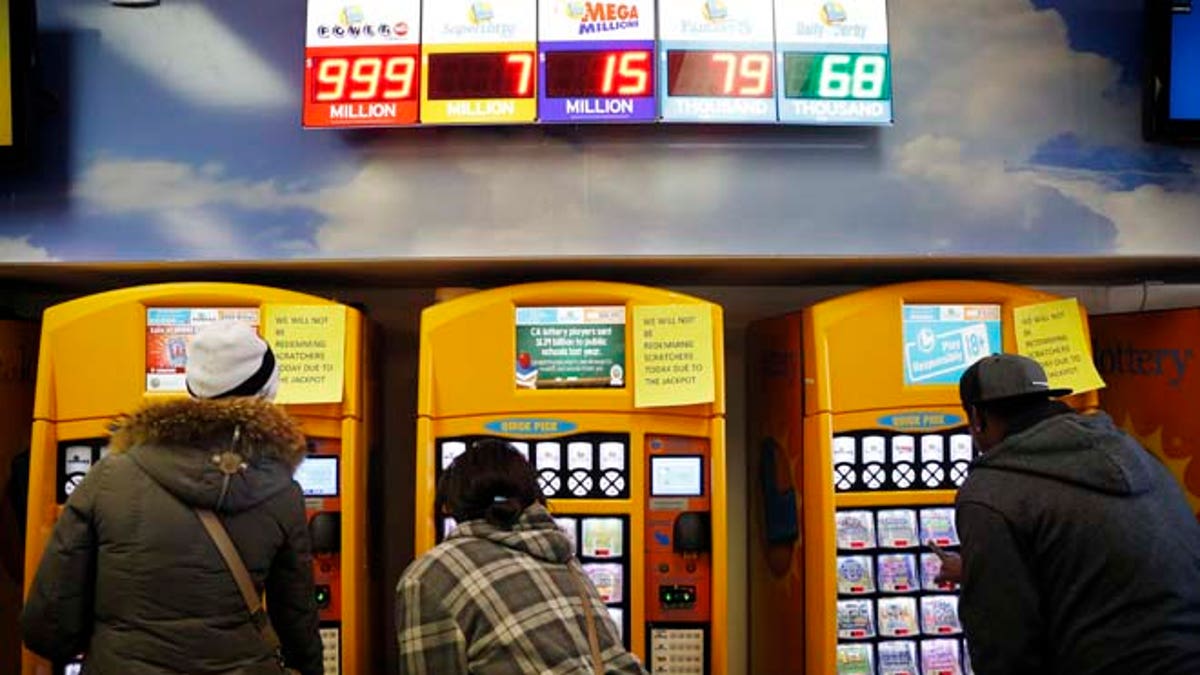
Despite the long odds, customers line up at the Primm Valley Casino in Nevada to but Powerball tickets. (AP)
NEW YORK – There’s a great scene in Al Pacino’s 2005 movie “Two for the Money” where his character, Walter Abrams, a tailored-suit-wearing sports betting handicapper, tells a small group at a Gamblers Anonymous-type meeting that they are all lemons.
“See,” Abrams says. “Most gamblers, when they go to gamble, they go to win. When we go to gamble, we go to lose. Subconsciously. Me, I never feel better than when they’re raking the chips away; not bringing them in.”
Although I disagree with his character and prefer to win, I understand the argument. It is the rush of the spinning wheel, the pack of horses turning at the top of the stretch or the last-second interception in the end zone that gives you the unusual combined feeling of desperation and excitement: I have money riding on this, there isn’t a thing I can do about it and it's all unfolding before my eyes.
We Powerball players do not need to be reminded that our chances are miniscule. The New York Times ran an article Wednesday optimistically titled, “You Will Not Win the Powerball Jackpot.” The writer essentially dashes any hope that tonight may be your lucky night.
“If you printed out the name of every United States resident on individual pieces of paper, put them in a giant bowl and selected one at random, the odds of picking President Obama are not far from the odds of winning the Powerball,” the article said.
The article also mentions that, say you’re a billionaire and have $584.4 million laying around and can play every possible scenario, it is still not a good investment because of the taxman and—contrary to the article's title—“you might have to split your winnings.”
It reminded me of yet another movie, “Dumb and Dumber,” when Jim Carrey’s character, Lloyd Christmas, finally confronts his love interest and asks her about the chances of them ever being together. Optimistically, he pins his odds at “one in a hundred.” She responded that it was more like one in a million. After hearing the increased odds, he couldn’t be happier and said, “So you’re telling me there’s a chance.”
If we only played our odds, few of us would go beyond what is expected.
I spent $20 Tuesday on a Powerball ticket. I bought it in my office’s lobby. I joked with the cashier that he’d be seeing me in a few days because the store that sell the winning ticket gets a little action, plus, I’m sure there will be a camera crew.
I don’t think it hurts, at times and within reason, to pursue a long-shot dream.
Take sports for example. There are 1,093,234 high school students lacing up their cleats for football this season. The NCAA estimates that of those, 6.5 percent will pay in college and 1.6 percent of college players will play in the NFL. Roughly speaking, that means out of the 1,093,234, only about 200 will play get to play pro. Investing in lotto and not football camps and equipment may actually be an economical decision for a family.
I have not fooled myself into thinking that because I spent $20 instead of $10 my chances increase like they would if I was betting for a blender at a church auction. But it’s a far-flung dream.
You imagine the hammock, margarita and calm beach. You think of paying off all your credit cards and the Park Avenue penthouse. The thought is fleeting and it passes. I will not stay up late Wednesday night to watch the drawing. But I’ll go to bed knowing that I’m in the running, and sometimes in life, a lot can be said about simply being in the running.